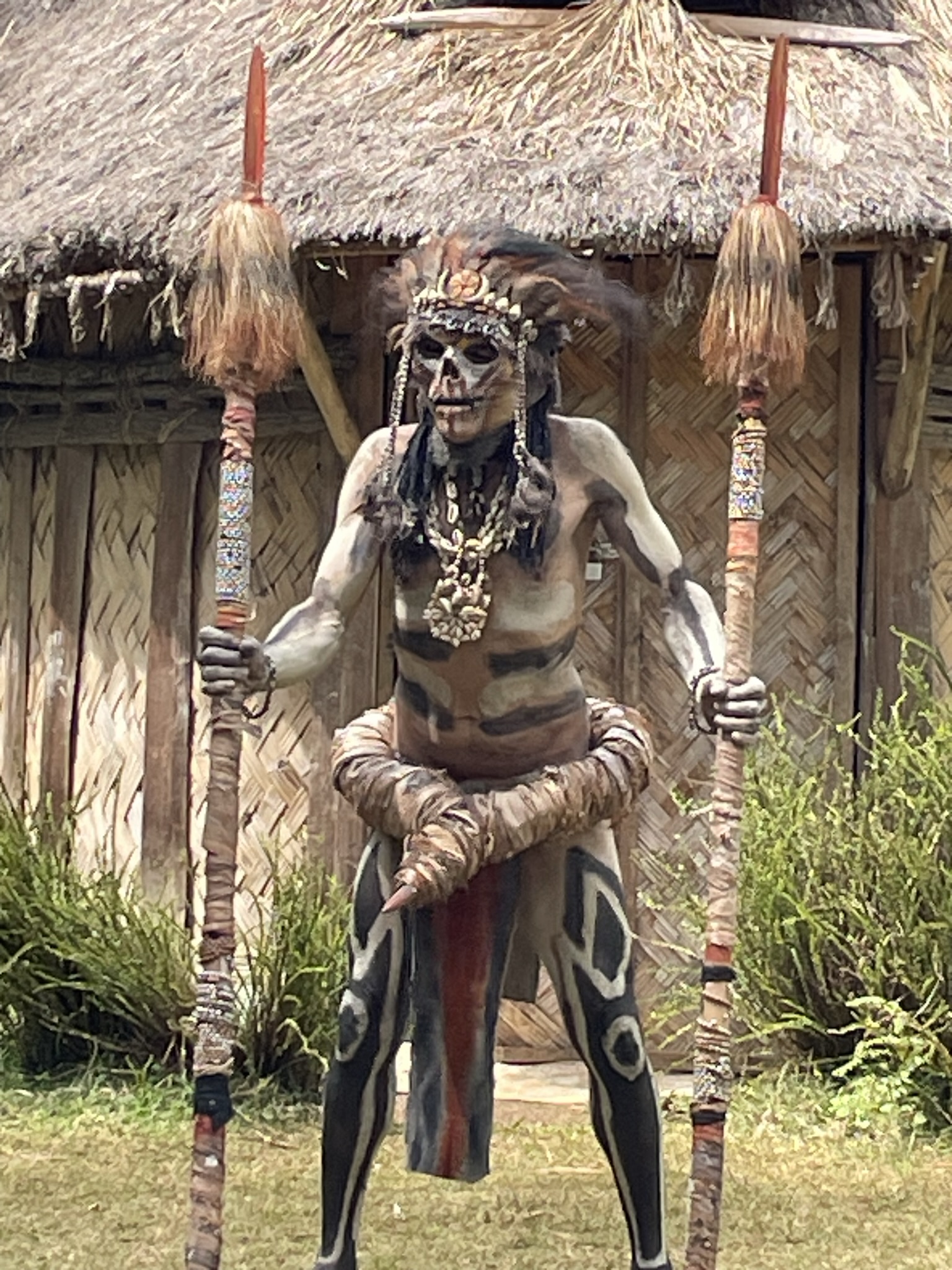Papua New Guinea is a tourist challenge. Hot water in the tap and on some days the availability of water at all is becoming a luxury. Life in Papua still follows the rhythm of nature. Fortunately, the climate here allows for several harvests of cassava or sweet potatoes in one year. Fruits grow on trees like crazy, locals know that all you have to do is stick a stick in the ground and it will start to take root and bloom. From the missionaries we heard the story of how a wooden cross and a wooden fence bloomed in their church…
It seems, therefore, that the abundance of nature provides enough food. And yet, in Papua New Guinea, there are still cases of cannibalism.
Papuans deeply believe in magic or puri-puri, charms and witchcraft. There are still cases of witch burning, which are most often taken for widows supported by the village after the death of their partner. When someone is in pain, gets sick, or has not returned from fishing or hunting, it is absolutely believed that the injured person has fallen victim to a curse and an evil eye.
The conditions for magical thinking in Papua are favorable – about 60% of the population cannot read and write, medical help is provided by shamans. About 30% of the population is infected with HIV, many people are not diagnosed. Limiting the spread of the virus generally involves isolating an infected person from the rest of the tribe. Alternatively, the undoing of spells by a shaman, professional medical help is very rare.
At the moment, it is estimated that there are between 700 and 1000 cannibals living in Papua New Guinea.
A deep belief in magic was the perfect breeding ground for the Black Jesus sect. Its members were convinced that by eating human flesh they absorbed the energy of the person they were eating and increased their magical powers, which gave them superhuman powers.
The black Jesus was Steven Tari, a Papuan born in 1971. When we think of cannibals, we think of savage tribes that have been minimally reached by civilization. In reality, however, cannibals are individuals who have access to education, dress normally, and drive cars. Steven Tari studied in Madang at Amron Bible College and planned to become a pastor in his youth. He dropped out of college or, according to other sources, was expelled from the university for stealing. At the age of 30, he and his friends went to the jungle mountains, where he founded a sect and proclaimed himself the messiah. He gave himself the title of Black Messiah. Tari had a lot of charisma and managed to gather quite a few followers. About 6,000 people belonged to the sect.
The leader of the sect deserved the best – he surrounded himself with a group of young women called flower girls. Concubines were recruited in the surrounding villages, only virgins were chosen. If the chosen one did not feel like having sex, rape was normal. Among the concubines, there were also girls under the age of 14.
Young girls were most often the victims of Tari’s “ceremony.” One of the most famous cases was the story of Rita Herman. The young girl was raped, then stabbed multiple times, her body was eaten by the Black Jesus and then by his followers. Pieces of the body were washed down by the participants of the ceremony with the blood of the deceased girl. Such a sacrifice provided the best increase in magical powers in the followers. Shockingly, Rita was brought to the Black Jesus by her father.
In 2005, the Papuan police, based on the law against sects and witchcraft, issued an arrest warrant for Tari. The law forbids making promises of material abundance in exchange for joining a cult. Tari was arrested and charged with cannibalism and rape. Unfortunately, he soon regained his freedom. He was helped in his escape by … the Lutheran pastor Sapus, who visited the messiah under the pretext of conversion and then helped him escape. The pastor was a follower of the cult of Black Jesus.
Tari fled into the jungle. He organized a strong bodyguard and, together with his followers, plundered and terrorized the surrounding villages, extorted oaths of allegiance from the villagers and kidnapped more girls and women. The youngest were 8 years old.
By 2007, the villagers had had enough. They organized a group that attacked the messiah’s camp, captured him and battered him. The police summoned took the messiah to prison. Tari made an attempt to escape, this time unsuccessfully. In court, he defended himself without a lawyer, invoking the principle of religious freedom. The trial lasted 3 years, and it was not possible to prove Black Jesus murders and cannibalism. He was sentenced to 10 years for 4 rapes.
6 years later, there was a mass escape from Beon prison in Medang province. 48 prisoners escaped, among them was Tari. The search for the cannibal began again.
Tari returned to his followers and was enthusiastically received by them. Fearing another arrest, he decided to leave Papua New Guinea for Israel. Before the trip, he planned to perform another ceremony. This time there were supposed to be three victims – 15-year-old Rosa and two other girls, 14 and 10 years old. The news about the planned ceremony reverberated widely around the area. 80 men gathered from the surrounding villages and decided to attack the sect’s headquarters.
The Black Jesus had managed to rape and murder Rosa, the two girls were waiting for their turn. Early in the morning, while the messiah was washing in front of the hut, he was attacked by some armed men from the surrounding villages. He ran away, but fell into the hands of another group. He defended himself, but was knocked to the ground. The villagers began to beat him with bamboo sticks and stab him with knives. Quickly, the messiah’s body turned into a bloody pulp. The villagers also caught up with 15-year-old Matus Ogmaba, Tari’s closest associate. He was bludgeoned to death just like his master. Both bodies were castrated and thrown into a shallow grave. A 15-year-old girl was rescued, but the 10-year-old was never found.
Everyone hoped that the cult of Black Jesus would die with him. However, cannibalism continued to be practiced. In 2012, police captured 28 men and charged them with murdering and eating at least 7 people. The murderers and victims were followers of black magic called sanguma, i.e. spellcasters. ‘They extorted money under the threat of a curse. They accepted money and women. For a separate fee, they cast curses on business competitors or helped to seduce a woman. A group of sanguma was attacked by a group of cannibals who wanted to take over the sorcerers’ powers and their money. The cannibals killed 7 sorcerers, ate their brains and cooked soup from their penises. The rest of the bodies were divided into parts and eaten in the following days. The powers taken over were to protect even against bullets.
The murderers who were caught cited as the reason for the murders were the immoral conduct of the sorcerers. They decided that sleeping with the wives and daughters of men from whom they charged a fee for casting spells was incompatible with good manners…
According to the Papuan authorities, cannibalism will be difficult to eradicate without eradicating faith in puri-puri. The belief in witchcraft and taking power by eating someone is still strong in Papua.
Apparently, the high incidence of malaria, accompanied by delusions and hallucinations, has a great impact on the belief in magic. And as we know, as of today, there is no 100% effective antimalarial agent…

